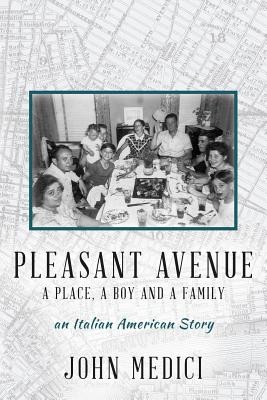
- Išsiųsime per 10–14 d.d.
- Autorius: John Medici
- Leidėjas: CreateSpace Independent Publishing Platform
- Metai: 2017
- Puslapiai: 246
- ISBN-10: 1548478318
- ISBN-13: 9781548478315
- Formatas: 15.2 x 22.9 x 1.3 cm, minkšti viršeliai
- Kalba: Anglų
- Extra -15 % nuolaida šiai knygai su kodu: ENG15
Atsiliepimai
Aprašymas
In Pleasant Avenue, John Medici chronicles his experiences as the son of Italian immigrants, growing up in NYC's East Harlem. During his early years in the ninteen forties, fifties, and into the sixties, he witnessed great social changes. As he matured, Medici bristled against the isolationism of his Italian American neighborhood, often feeling trapped between modern society and the religious culture which his parents and community cherished. Pleasant Avenueis a candid examination of the psychological burden he carried during his first thirty years, when attempting to honor his parents' culture, yet live his own life.
Medici peppers his work with humorous anecdotes about family, neighborhood and his conflicts adjusting to East Harlem's bygone world of social mores. Pleasant Avenue, An Italian American Story also reveals his struggle, coming to terms with the Catholic Church's teachings; a stint as a novice in a Franciscan seminary was his solution for two years. On top of adjusting to cultural heritage and creating his own identity, Medici had to cope with the effects of alcoholism in the family. That is a different, legacy that he couldn't completely reject.
At the center of Pleasant Avenue is an honesty about culture, heritage, neighborhood and values; this honesty is usually covered over by sentimental nostalgia. Medici's story about a "Place, a Boy and a Family" is truthfu and a powerful revelation.
EXTRA 15 % nuolaida su kodu: ENG15
Akcija baigiasi už 5d.14:40:48
Nuolaidos kodas galioja perkant nuo 10 €. Nuolaidos nesumuojamos.

- Autorius: John Medici
- Leidėjas: CreateSpace Independent Publishing Platform
- Metai: 2017
- Puslapiai: 246
- ISBN-10: 1548478318
- ISBN-13: 9781548478315
- Formatas: 15.2 x 22.9 x 1.3 cm, minkšti viršeliai
- Kalba: Anglų
In Pleasant Avenue, John Medici chronicles his experiences as the son of Italian immigrants, growing up in NYC's East Harlem. During his early years in the ninteen forties, fifties, and into the sixties, he witnessed great social changes. As he matured, Medici bristled against the isolationism of his Italian American neighborhood, often feeling trapped between modern society and the religious culture which his parents and community cherished. Pleasant Avenueis a candid examination of the psychological burden he carried during his first thirty years, when attempting to honor his parents' culture, yet live his own life.
Medici peppers his work with humorous anecdotes about family, neighborhood and his conflicts adjusting to East Harlem's bygone world of social mores. Pleasant Avenue, An Italian American Story also reveals his struggle, coming to terms with the Catholic Church's teachings; a stint as a novice in a Franciscan seminary was his solution for two years. On top of adjusting to cultural heritage and creating his own identity, Medici had to cope with the effects of alcoholism in the family. That is a different, legacy that he couldn't completely reject.
At the center of Pleasant Avenue is an honesty about culture, heritage, neighborhood and values; this honesty is usually covered over by sentimental nostalgia. Medici's story about a "Place, a Boy and a Family" is truthfu and a powerful revelation.




Atsiliepimai